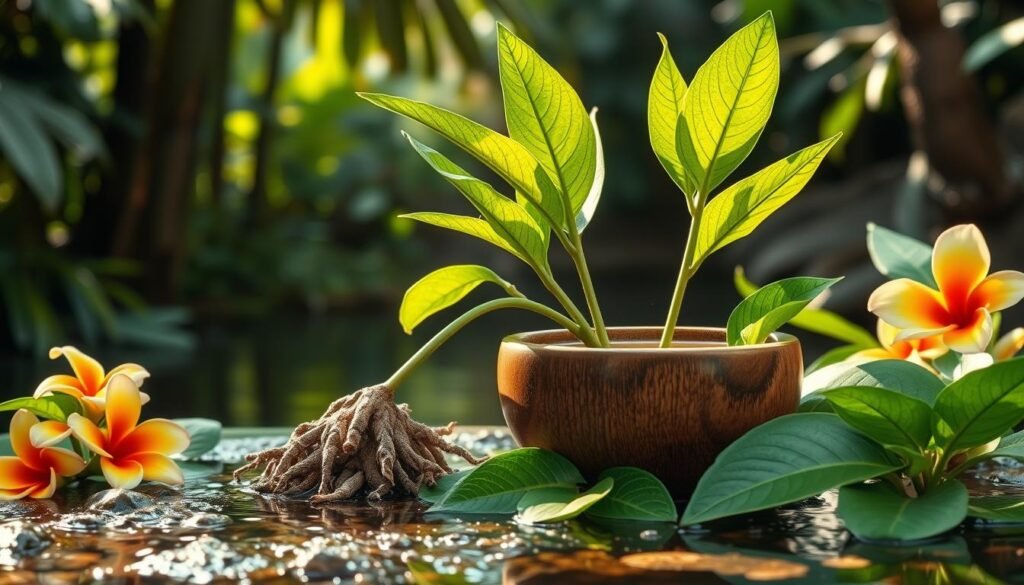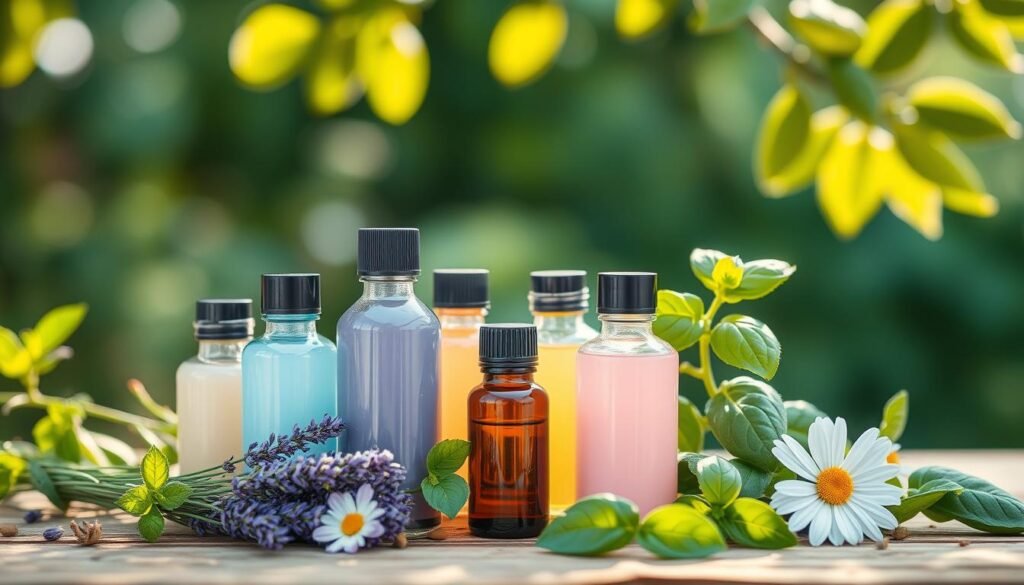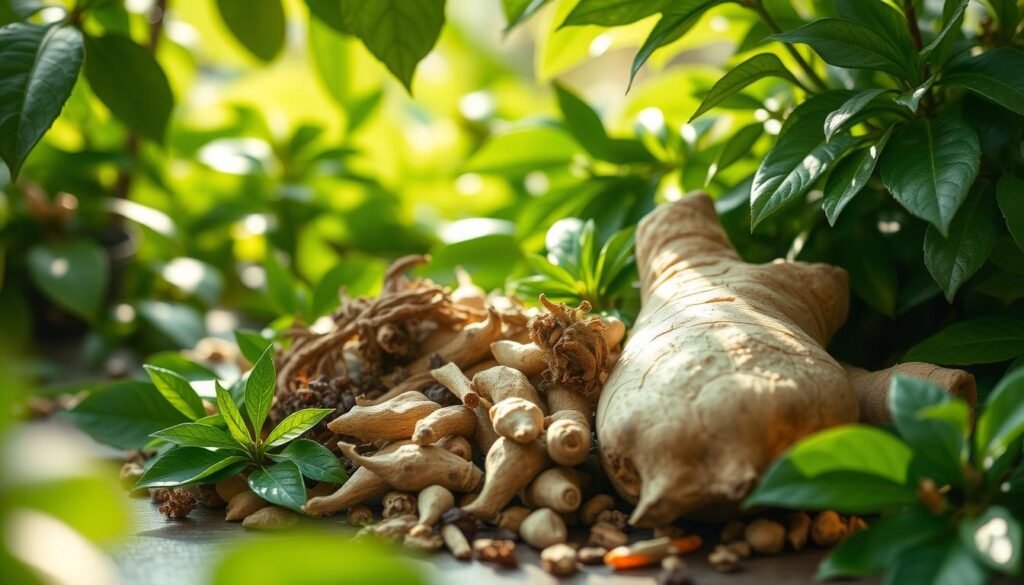About 300 million people globally are battling depression, about 4.4% of the world’s population. In our times, mental health issues are climbing. More people are looking towards nature for answers. Anxiety herbs have gained fame as a natural way for those seeking a peaceful mind. With stress hitting high in our quick lives, people are curious about herbal solutions. They want to manage anxiety without just using synthetic drugs, which can have scary side effects.
Many are drawn to anxiety herbs because of their long history and recent studies showing benefits. However, it’s key to be careful with these natural options. Talking to a doctor before trying new treatments is a must. This ensures they’re safe, especially if you’re already on anxiety meds. In this article, we’ll explore natural remedies further. We’ll talk about how certain anxiety herbs work and how to add them to your life.
Key Takeaways
- Anxiety herbs are gaining popularity as more people seek natural remedies for managing stress.
- Consulting healthcare professionals is important before trying any new herbal treatments.
- Herbal remedies can offer potential benefits without the side effects often associated with synthetic medications.
- Understanding the history and modern research behind these natural solutions is vital for safe use.
- This article will explore specific anxiety herbs and their unique properties for better mental health.
The Rise of Natural Remedies for Anxiety
Nearly 30% of Americans feel anxiety during their lifetime. Now, many are choosing natural remedies for anxiety over traditional drugs. These drugs can have side effects. Instead, people are turning to herbal treatments as a safer choice.
Understanding Anxiety in Modern Life
Anxiety shows up in different ways, from specific situations to generalized anxiety disorder (GAD). With growing societal stress, the search for effective solutions is on the rise. Herbal remedies are becoming a popular choice. They offer relief with fewer risks than some medicines. However, it’s still key to talk to doctors before starting herbal treatments.
Exploring the Benefits of Herbal Treatments
Herbs are getting attention for their natural approach to calming the mind. Studies show herbs like ashwagandha can lower stress hormones and aid sleep. Chamomile also helps, especially in keeping GAD symptoms at bay. Lavender and valerian root are known for their soothing effects, enhancing emotional health.
Many seeking help for mental health issues consider herbal treatments. These natural options could help a lot of people with anxiety disorders. They can also provide important nutrients, like magnesium and omega-3s. By choosing natural remedies, we’re taking steps towards better health and self-care.
Anxiety Herbs You Should Know About
Looking for natural ways to ease anxiety can really change how you feel every day. Many herbs are known for their ability to calm and soothe our minds. Here are some important herbs that help with anxiety.
Chamomile: Nature’s Soothing Drink
Chamomile tea is well-loved for its calming effects. Studies show it might lessen symptoms of generalized anxiety disorder. This means drinking chamomile tea regularly could make you feel happier and less anxious.
Lavender: A Floral Remedy for Calm
Lavender is famous for helping people relax. It’s used in aromatherapy and as a natural remedy. Studies show lavender can help you relax and sleep better. Its scent is known to reduce anxiety, making it a go-to for those seeking peace.
Valerian Root: The Sleep Supporter
Valerian root is known to ease anxiety and help you sleep. It’s a natural sleep aid that encourages relaxation. It’s perfect for those having trouble sleeping because of stress. Research shows it helps calm the nervous system, offering a peaceful night’s sleep.
Passionflower: A Gentle Anxiety Calmer
Passionflower is effective but gentle on anxiety. It boosts GABA levels in the brain, which helps you feel calm and relaxed. It has been used for a long time to reduce anxiety, making it a reliable natural option for daily stress.
Kava Kava and Its Anxiety-Reducing Effects
Kava kava comes from the South Pacific and is known for reducing anxiety. It has been used in traditional societies for hundreds of years, often during social gatherings. Research shows it can help lessen anxiety, making it popular among those looking for natural remedies.
The Origin and Properties of Kava
Kava is made from the root of the Kava plant. Its calming effects come from compounds called kavalactones. Studies suggest these compounds can help with anxiety. People usually take 20 to 300 mg per day for mild to moderate anxiety relief.
Kava helps with relaxation and better sleep. However, it’s important to be careful because of potential liver health issues.
Dosage and Precautions for Use
The right amount of kava kava is key. Adults should take 60 to 250 mg in supplement form. It’s important to watch out for how it mixes with other things like alcohol or certain medications. This is due to the risk of serious side effects, such as acute urinary retention.
Always talk to a healthcare provider before using kava, especially if pregnant, breastfeeding, or having health problems. Knowing the benefits and risks is crucial for using it safely.

Aromatic Allies: Essential Oils for Anxiety Relief
Essential oils are a natural way to ease anxiety. They are often used in aromatherapy. By using their calming qualities, people can improve emotional health easily. Lavender and chamomile oils are especially known for their soothing effects on anxious feelings.
Using Lavender and Chamomile in Aromatherapy
Lavender oil is famous for its calming effect. It helps in mood regulation and can lower blood pressure. A 2013 study showed it might protect the brain. Chamomile oil is known for helping with sleep and reducing stress. Using these oils through diffusion or topical application can aid relaxation and mental clarity.
Benefits of Frankincense and Vetiver
Frankincense oil is praised for its soothing and grounding effects. Studies indicate it can calm the nervous system and bring peace. Vetiver, called the “oil of tranquility,” helps with relaxation too. Its deep, earthy smell is effective against anxiety. Trying these oils can improve mindfulness and bring peace during the day. For more tips on natural anxiety relief, visit this guide.

Incorporating Adaptogens into Your Routine
Many people look to adaptogens for help with stress. These natural helpers support the body’s balance during stress. Ashwagandha and Holy Basil stand out for their mental health benefits.
Ashwagandha: Balancing Stress and Energy
Ashwagandha is known for reducing anxiety and depression. It’s become more popular as stress has increased since the pandemic began. It works with the body’s stress response system, the HPA axis.
People often take 500-1000 mg of ashwagandha daily. It’s available in teas, powders, and capsules, making it easy to use every day.
Holy Basil: Easing the Stress Response
Holy Basil is also called Tulsi and helps soothe stress. It might improve your immune system and focus while lowering anxiety. It’s easy to fit into daily life.
You can enjoy Holy Basil benefits through teas or supplements. Using adaptogens like these regularly is key to their stress relief benefits.

Adding adaptogens like ashwagandha and Holy Basil to your routine can upgrade your stress management. For more help, consider learning about coping and therapy from managing anxiety attacks.
Nutritional Approaches to Anxiety Management
Addressing anxiety through diet can help many people. Eating foods that boost mood may improve well-being. Certain nutrients in these foods can help manage anxiety.
Magnesium-Rich Foods
Leafy greens, nuts, and seeds are good for nerves and mood because they have magnesium. This mineral can calm the nervous system and may lower anxiety. Foods high in magnesium are:
- Spinach
- Almonds
- Avocado
- Black beans
- Dark chocolate
Adding magnesium-rich foods to your meals can naturally reduce anxiety. Always talk to a doctor before changing your diet a lot.
The Power of Omega-3 Fatty Acids
Omega-3 fatty acids are essential for a healthy brain. They’re in fish like salmon and plants like walnuts. They help with emotional balance and can decrease anxiety symptoms. Here are some omega-3 rich foods:
- Salmon
- Sardines
- Walnuts
- Chia seeds
- Flaxseeds
Looking into nutrition for anxiety can lead to beneficial lifestyle changes. Magnesium and omega-3s are good additions to regular anxiety treatments.
Mind-Body Techniques Complementing Herbal Remedies
Mind-body techniques can make herbal remedies for anxiety even better. Techniques like progressive muscle relaxation and deep breathwork help create peace. They match well with herbs, forming a complete plan to tackle anxiety.
Progressive Muscle Relaxation for Tension Relief
Progressive muscle relaxation eases muscle tension and boosts relaxation. You tense and relax muscles in order, feeling more in tune with your body. This reduces anxiety. It’s even more effective with herbal remedies, as it helps relax your mind and body deeper.
Breathwork and Meditation for Anxiety Control
Breathwork and meditation are key for managing anxiety. Studies show that meditation can cut down anxiety symptoms, making it a great partner for herbs. Deep breathing can calm your nerves and focus your mind, giving quick relief in stressful times. Daily meditation builds stronger mental defenses against anxiety.
| Mind-Body Technique | Description | Benefits |
|---|---|---|
| Progressive Muscle Relaxation | Tensing and relaxing muscle groups systematically. | Reduces muscle tension, promotes relaxation, heightens body awareness. |
| Breathwork | Focusing on deep, controlled breathing techniques. | Calms the nervous system, enhances mental clarity, reduces stress. |
| Meditation | Mindfulness practices focused on breath and present awareness. | Significantly lowers anxiety levels, improves emotional regulation. |
Using mind-body techniques with herbal remedies leads to better anxiety management. It improves both your mental and physical health.
Consulting Professionals for Tailored Treatment Plans
Adding herbal remedies to your anxiety treatment needs careful thought. It’s key to work with professional guidance from healthcare experts. They design treatments just for you, considering your unique needs. This matters a lot because herbal products might not mix well with other medicines. This can sometimes cause harmful effects.
Importance of Healthcare Guidance
Healthcare experts know how different herbs can help or harm. They suggest practices backed by research, like mindfulness and changes in diet, to help mental health. The American Psychological Association points out how mindfulness helps control anxiety.
Finding Reputable Sources for Herbal Products
Getting the most from herbal treatments means finding the best products. Look for sellers who are clear about where their herbs come from, and who test and certify their goods. Choosing companies you can trust is crucial for safe, effective anxiety treatments. Sites like Meditative Minds Counseling offer advice on picking the right products and treatments.
Conclusion
Anxiety herbs hold promise for tackling stress and anxiety, bringing benefits for well-being. They include chamomile, valerian, and passionflower which show how nature aids mental health. Each herb has unique qualities, backed by studies like the calming effects in Ashwagandha or Bigelow’s Cozy Chamomile Tea’s soothing touch.
While these natural solutions are generally safe, effects can differ from person to person. Hence, the importance of ongoing research in this area cannot be understated. Many findings suggest these herbs are helpful, but it’s key to speak with healthcare providers for advice tailored to you. A study on the impact of medicinal herbs on anxiety offers further insights.
The quest for effective anxiety management with herbal remedies continues. By exploring and understanding the role of various anxiety herbs, individuals can make informed decisions towards mental wellness. Using these plant-based solutions for anxiety can lead to better emotional health and resilience in today’s fast-paced world.